6 Ways Music Therapy Can Support Children With Autism
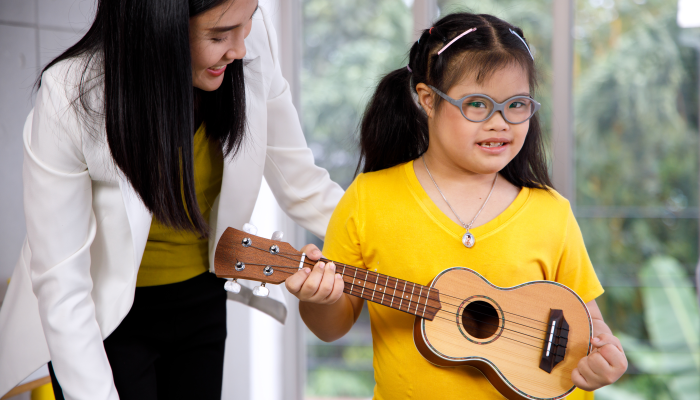
- Music therapy is an effective alternative to traditional communication methods for verbal and non-verbal autistic children.
- Group music therapy sessions provide a safe environment for practicing social interaction and improving vocal communication skills.
- Techniques introduced in music therapy can help develop cognitive and motor skills and serve as calming tools, improving sensory overload management and reducing anxiety.
Autistic children typically struggle to communicate, socialize, regulate their emotions, and manage sensory input. Carefully structured musical therapy sessions can help.
Music therapy for autism offers a therapeutic, non-verbal method of communication and expression. Children also develop skills to help them engage more fully with the world around them when they partake in musical activities.
With the right program, your autistic child can overcome some of their challenges.
What Is Music Therapy?
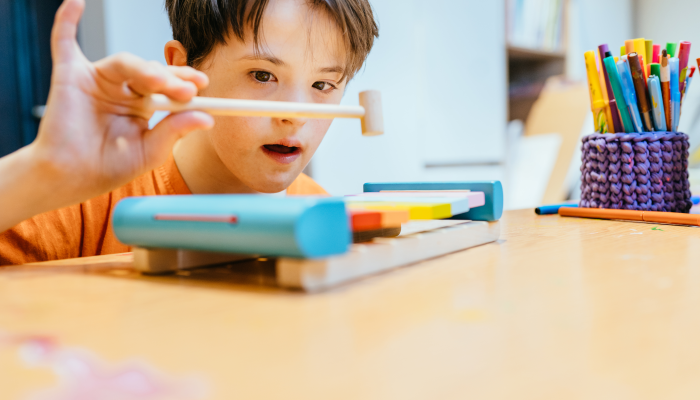
Music therapy is precisely what it sounds like: an evidence-based therapy that uses music to help people reach developmental goals.
For autistic children, this specialized early intervention practice uses interactive musical activities to help them improve their social, communicative, emotional, and cognitive skills.
Music programs are designed to meet your child’s unique needs in a mostly indoor environment through musical experiences. A credentialed music therapist who has received comprehensive clinical training in music and therapy guides the process.
By engaging in music therapy, your autistic child can explore new ways of communication beyond words, enhancing their ability to express themselves and connect with others.
Music therapy includes interactive singing, playing instruments, and improvisational expression.
Many people with autism struggle to manage sensory sensitivities. Music therapy also helps with this and improves self-regulation.
Research, more specifically a 2009 study11. Kim, J., Wigram, T., & Gold, C.. Emotional, motivational and interpersonal responsiveness of children with autism in improvisational music therapy. Autism. 2009;13(4), 389–409. https://doi.org/10.1177/1362361309105660 on the responsiveness of children partaking in improvisational music therapy, shows that musical therapy promotes social, emotional, and motivational development in autistic children with higher success rates than toy play.
Here are more detailed explanations of how music therapy can support your autistic child:
#1: Music Therapy Improves Communication Skills
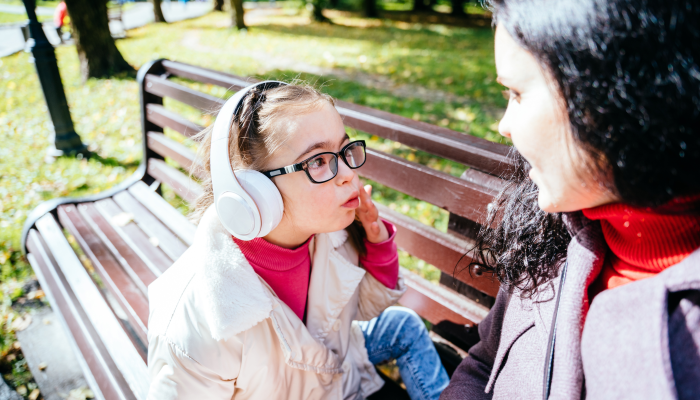
Like many other autism therapies, one of the primary goals of music therapy is to improve social communication skills.
Autistic children typically find traditional forms of communication challenging. Music therapy offers an alternative by facilitating non-verbal communication.
The instruments used and rhythmic cues can become tools for your autistic child to express their feelings and thoughts. This method also encourages speech and language development through singing and vocal exercises, making it an excellent approach to speech therapy.
Your little one will improve their vocalization with specific activities in these types of programs while also working on their social and communication skills.
Group and family centered music therapy sessions are particularly effective.
These offer a safe and structured environment for your special needs child to practice social interaction and vocal communication, improving their ability to connect with others outside therapy sessions.
#2: Music Therapy Develops Social Skills

Developing social skills is another critical area where music therapy shows promise for autistic children.
Through music, children are naturally encouraged to interact. Musical activities can teach your child social behaviors like turn-taking, sharing, and cooperation. In these programs, each activity is designed to be interactive and fun so your little one will feel drawn to participate and engage with other children.
Group musical activities also help autistic children see and learn to understand social cues and norms.
By participating in musical group sessions, your child can investigate social behavior in a controlled yet naturalistic environment. This approach not only makes learning social skills more engaging but also less intimidating for children with autism spectrum disorder.
As they play music and do rhythmic activities with others, your autistic child will learn to interpret social cues and respond appropriately.
#3 Music Therapy Improves Emotional Regulation

Many children on the spectrum struggle to identify, express, and manage their emotions. Through music, they can explore different feelings and learn how to express them non-verbally.
This aspect of music therapy is particularly beneficial for those on the autism spectrum who find verbal expression challenging. Creating and listening to music can help your autistic child project their inner emotional state safely when they don’t know another way to communicate it.
Music therapy is also designed to help autistic children identify and label their emotions through musical activities. Your child’s music therapist might play songs with varying tempos and ask your child to identify which piece of music matches how they’re feeling.
Activities like this help in emotional literacy as well as emotional regulation. It offers children a clearer understanding of their emotional state and responses.
Music therapy also introduces techniques for using music as a calming tool.
A common challenge for autistic people is feeling overwhelmed by sensory input. With music therapy, your little one will learn how to manage this feeling by listening to soothing melodies or rhythmic drumming with their hand on their leg.
Doing either of these can reduce anxiety and help autistic children manage sensory issues.
#4 Music Therapy Develops Cognitive Abilities
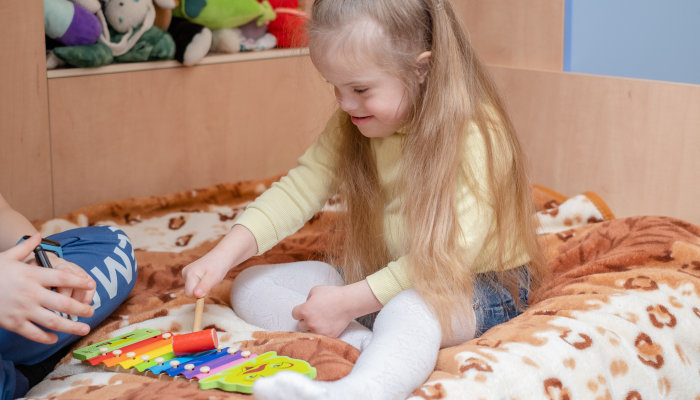
Musical activities and games stimulate a range of cognitive functioning, including:
- Problem-solving
- Pattern recognition
- Memory
- Attention
- Counting skills
Through music therapy, your child will learn to think critically and creatively in a fun and educational environment.
Repetitive musical patterns—a common element in many music therapy interventions—play a big role in improving attention and memory recall. The predictability of these patterns helps to focus children’s attention, making it easier for them to follow along and participate actively.
This aspect of music therapy will be particularly beneficial for your autistic child if they struggle with attention span and memory issues.
Music therapy also teaches children to plan, organize, and complete tasks, all while having fun with songs!
#5 Music Therapy Helps with Sensory Integration
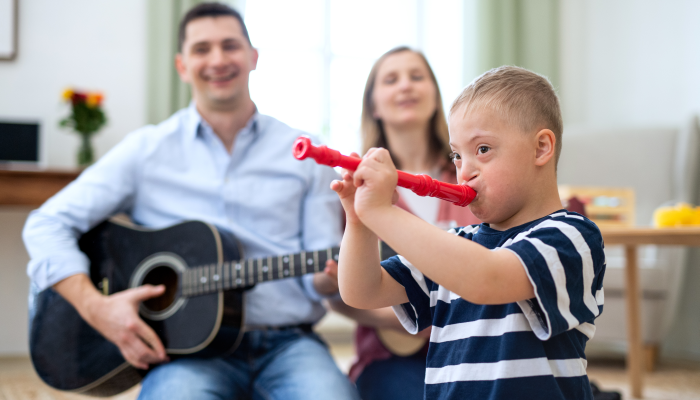
If your little one experiences heightened sensory sensitivities, sensory integration will play an essential role in their therapeutic journey.
Music can be a structured yet adaptable approach to addressing their sensitivities using controlled musical exposure.
Each autistic child has a unique sensory profile. Your child’s therapist can select music that aligns with theirs and create experiences that gently challenge and expand their sensory tolerance.
Rhythm and melody (fundamental elements of music) are particularly effective in improving sensory integration.
The predictable structure of rhythmic patterns can help autistic children process sensory information more easily, while melody captures attention and focus to help make sensory experiences more tolerable.
#6 Music Therapy Improves Motor Skills
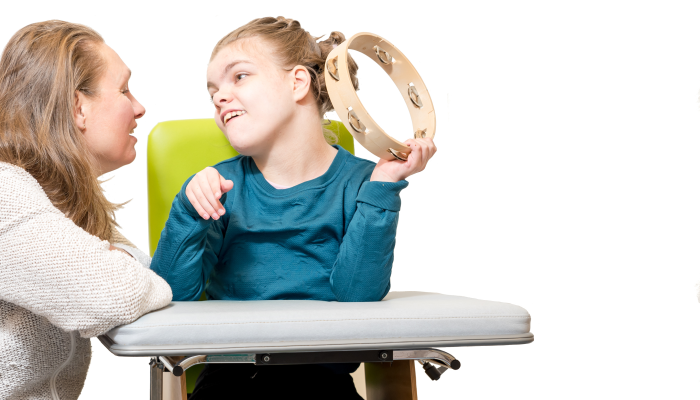
Music creates a fun way to practice gross and fine motor coordination.
When children play musical instruments, whether it’s the delicate pressing of piano keys or quick movements needed to strike a drum, they develop hand-eye coordination and fine motor skills.
They also practice coordination and balance through movement-based activities and dance.
These types of activities will not only make music fun for your little one but also improve their ability to perform everyday tasks more efficiently.
Your child will be encouraged to explore and express themselves physically, become more aware of their body, and gain confidence in a structured yet freeing environment.
Through interactive music-making, children become motivated to work on their skills.
From tapping a rhythm to moving freely to the music, these activities help develop motor skills and support your child’s overall well-being.
Autistic Children Can Find Their Rhythm Through Music Therapy
Although there are many other alternative treatments and therapies for autism, music therapy shouldn’t be overlooked.
This type of therapy addresses a wide range of developmental areas in an engaging environment that encourages children to explore and express themselves in new and empowering ways.
Organizations like Autism Speaks and the American Music Therapy Association highlight music therapy as a beneficial intervention that can be part of a comprehensive treatment plan.
As research continues to prove the benefits of music therapy, it offers hope to families looking for effective interventions.
By working with a good music therapist, your autistic child can experience improvements in areas critical to their development, well-being, and quality of life.
References
- Kim, J., Wigram, T., & Gold, C. (2009). Emotional, motivational and interpersonal responsiveness of children with autism in improvisational music therapy. Autism, 13(4), 389–409. https://doi.org/10.1177/1362361309105660
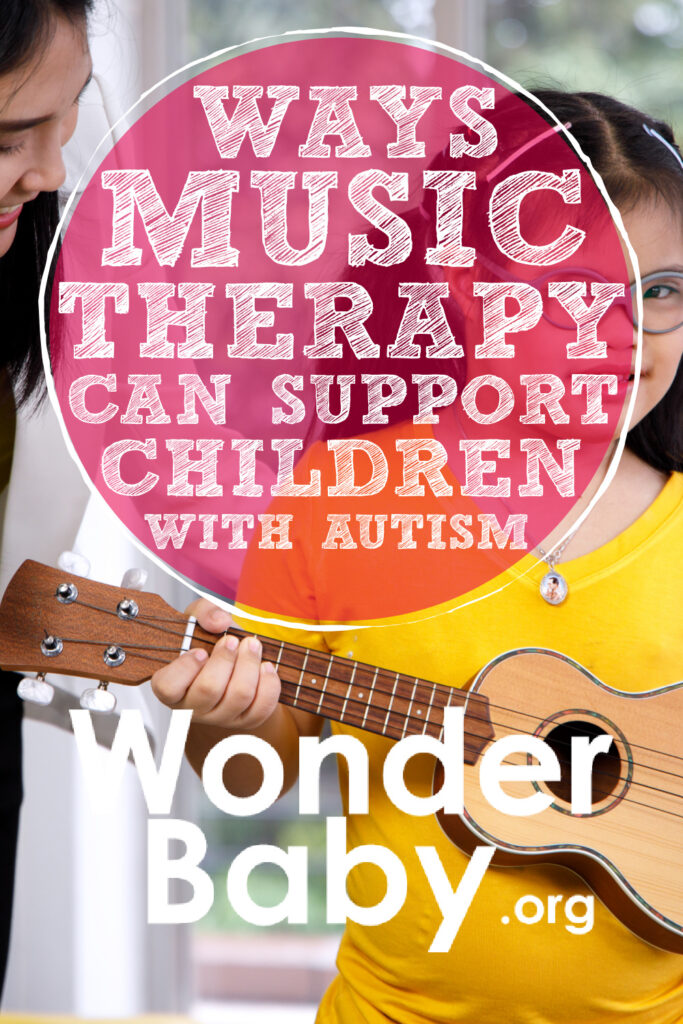
Related Posts
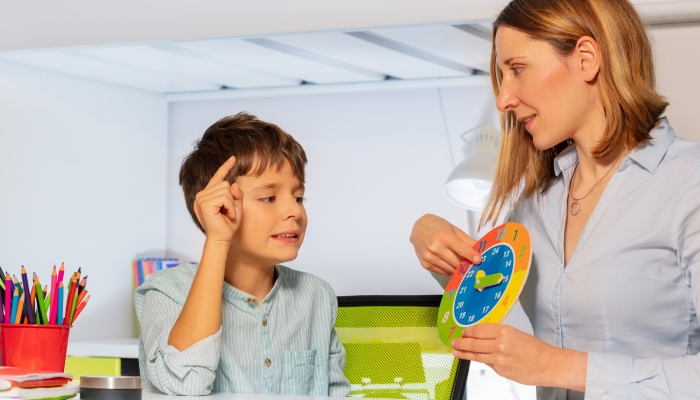
Autism
Developing Time Management Skills in Children with Autism: 7 Tips
Learn how you can use structure and visual aids to help your child with autism learn time management skills.

Autism
Occupational Therapy for Children with Autism: How It Can Make a Difference
Children with autism face challenges in many different areas. Occupational therapy can help children address these difficulties while having fun!

Autism, Behavior
OCD vs Autism in Children: How To Tell the Difference
OCD and ASD are fundamentally different, but their symptoms are very similar. Learn how to tell the difference to support your child.